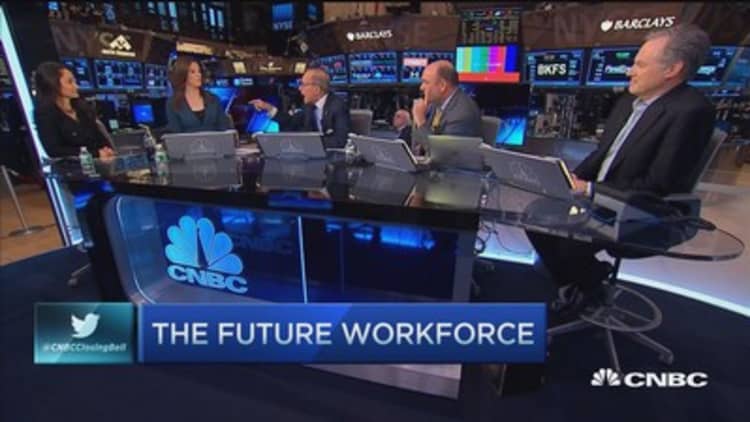
The jobs landscape is going to change dramatically in the future thanks to new technology, which will push out some jobs while creating others, experts said Wednesday.
"Technology is going to create a lot of job categories but they're going to be in technical fields," Freelancer.com CEO and chairman Matt Barrie said in an interview with "Closing Bell."
"At the same time, like any new technology coming in, it's going to cause disruption and a lot of jobs are going to go. So any job that is described by an algorithm will go over time."
That is unsettling news for many. Already, 40 percent of unemployed Americans have said they have given up looking for work, according to a new Harris poll conducted for Express Employment.
Read More40 percent of unemployed have quit looking for jobs
Eric Horvitz, managing director of Microsoft Research, said technology has always been a source of shifting distributions within the workforce.
"I expect there to be some disruptive influences of AI [artificial intelligence], in the realm of the intellect, which is a new area, a new category where computers are inching their way into the world," he said.
He believes the influence of machine intelligence and competing technology may be related to the widening gap in per-capita GDP and the mean income.
Meanwhile, there are all sorts of changes already happening in the workforce, Barrie said. For instance, Freelancer.com now has bots posting jobs on its site, and freelancers are using software to win employment.
He also thinks a number of jobs will head to software, starting with things like copywriting. In fact, author Philip M. Parker is already using software to write his books, Barrie noted.
"We're going to see dramatic change," he said. "The biggest impact we're going to see is going to happen in industries where the workforce is going to have trouble reskilling."
Read More
For example, he thinks the transportation industry, and job like couriers and taxi drivers, could face big challenges thanks to driverless cars.
"You're going to have big problems with the workforce," Barrie warned.
However, those who adapt and learn to embrace the new tech reality will likely fare well.
Horvitz said a deep interest in computer science, how it works and how humans can complement computing systems is key.
"There'll be new kinds of teamwork coming to the fore; data science is growing by leaps and bounds. [There are] lots of things to do," he said.
Cynthia Breazeal, founder of the world's first social robot for the home called Jibo, believes technology and humans can work hand in hand.
"What we're creating [are] robots that really are teammates and complement the services that human professionals can provide but also help empower families in the home."
She also thinks artificial intelligence can play an important role in education.
"Education is absolutely key to remaining competitive in the modern world," Breazeal said.


